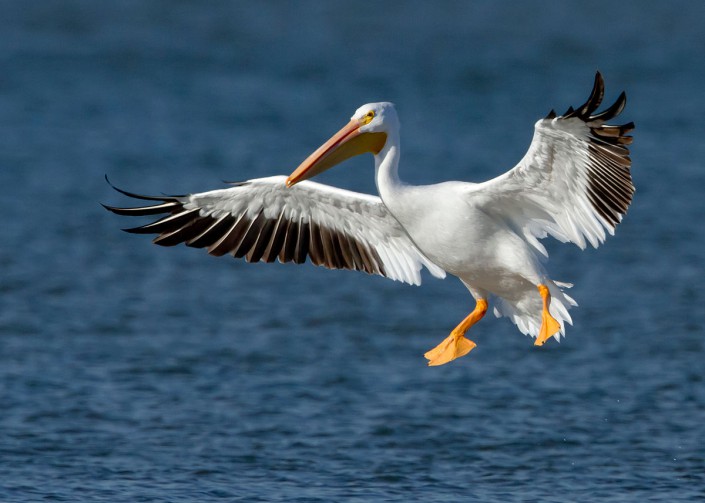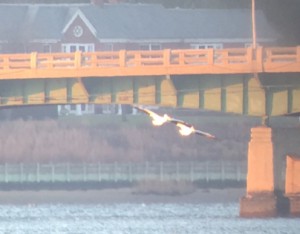Rare White Pelicans Seen in Monmouth County, New Jersey
Sandy Hook Christmas Bird Counters Delighted by White Pelicans
by Lindsay McNamara, Communications Manager

My alarm was set for 4:00 AM on December 20, a Sunday morning. I woke up excited and eager to start the day. My phone started going off with text messages from friends about our meeting location. As any birder will tell you, this scenario is far from uncommon — we love our birds! and will likely wake up at any time on any day for a chance to add another species to our life list.
I woke up early to look for owls to tally in the Sandy Hook Christmas Bird Count (Highlands and Atlantic Highlands territories are included in the Sandy Hook count). Our team drove through Hartshorne Woods Park in Highlands, New Jersey, in search of the nocturnal raptors. I thought the highlight of my day would be hearing two great horned owls calling to each other as first light came over the woods. While this was exciting (and definitely worth getting up at 4:00 AM for), I was in for another treat.
By 7:00 AM, our team grew into a group of six “bird nerds.” We were surveying the Navesink River, counting waterfowl, herons, songbirds and gulls, when Monmouth County Audubon Society‘s Rob Fanning yelled “three white pelicans”and sure enough, the pelicans were flying around the Oceanic Bridge in Rumson! I missed them the first time, but luckily the birds came back around and we were all able to watch them fly and swim through the scope. We shouted, laughed, smiled and high fived each other. One of my favorite aspects about birding is how quickly wildlife brings people together. Suddenly, we were the dream team.

According to Cornell Lab of Ornithology, American white pelicans are one of the largest North American birds — considerably larger than a bald eagle, but smaller than a California condor. They feed from the water’s surface, dipping their beaks into the water to catch fish, such as minnows, carp and suckers. White pelicans often upend, like a large dabbling duck, in this process. They do not plunge-dive the way Brown Pelicans do.
They are superb soarers (they are among the heaviest flying birds in the world) and often travel long distances in large flocks by soaring. Adult American White Pelicans are snowy white with black flight feathers visible only when the wings are spread.
Northern breeding populations migrate to southern California, the Gulf States, Mexico, and Central America. White pelican populations breeding in Texas and Mexico are resident populations.

The pelicans, first spotted by Rob, were the first Sandy Hook Christmas Bird Count (CBC) record in the 39-year count history! We saw the “three amigos” again later in the day at Many Mind Creek in Atlantic Highlands flying towards Staten Island.
Incidentally, three white pelicans were reported on December 27 in Connecticut. Our team wonders if those are our buddies. Monmouth County Audubon Society’s Lisa Fanning also stated that there have been up to five in Maryland, but she believes a small population may winter there. There are a number of winter records in eBird, mostly of a handful of birds (one report of up to 21 on January 1, 2012) at Blackwater NWR in Maryland.
During the 39th Sandy Hook CBC, 101 species were tallied. Each year, from December 14 through January 5, tens of thousands of volunteers throughout the Americas collect data used by scientists to study the long-term health and status of bird populations across North America. CBC informs strategies to protect birds and their habitat, and helps identify environmental issues with implications for people too. Find a count near you on Audubon’s website.
Lindsay McNamara is the Communications Manager for Conserve Wildlife Foundation of New Jersey.
Discover more from Conserve Wildlife Foundation of NJ
Subscribe to get the latest posts sent to your email.
Leave a Comment
What beautiful birds they are! And so far north…Here in Jamaica we have Brown Pelicans, mostly on our south coast – I love watching them dive into the water.
Comments are closed.